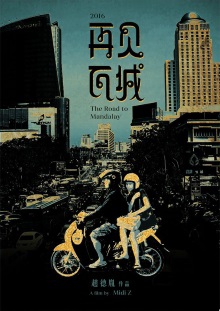
Leaving aside the rarity and hence novelty value of a film about Burmese emigrants, I don’t think I could resist checking out something named after the famous poem by Rudyard Kipling. It was made by Midi Z who was born in Myanmar but is now Taiwanese. Its most notable star is Kai Ko who shot to fame due to You Are the Apple of My Eye but subsequently fell into disgrace after being caught in a drugs bust.
Lien Ching is a young Burmese girl who pays smugglers to get her to Thailand where she hopes to earn a better living and send money back home to her family. Along the way, A-kuo, a young man from the same Burmese hometown of Lashio shows her some kindness. Some Burmese girls try to find her an office job in Bangkok to take advantage of her education but fail as she lacks a work permit. Even when she gets a job as a dishwasher in a restaurant, she is caught by the authorities and let go by her employer. A-kuo helps her find a job at a textile factory where he works and they become a couple. A-kuo is content to work at the factory until he saves enough money to return to Myanmar. Lien Ching however yearns to work in the city and repeatedly attempts to have proper identification papers made, persevering even after they pay expensive bribes only to get fake papers.
Though a film about Burmese and set in Thailand, The Road to Mandalay essentially feels like a Taiwanese film through and through, right down to the distance that the camera maintains between the characters and the audience. Production quality is crude and acting quality less than satisfactory. For pretty much the entire length of the running time, lead actress Wu Ke-xi’s face looks like it’s perpetually stuck on the verge of breaking out in tears. Often this lack of professional polish can help a film feel more grounded and authentic but that also relies on having an auteur being insightful and distinctive enough to make it work. Unfortunately there’s no sense here of the director being an unrecognized genius at work. The whole thing is a straightforward portrait of the misery that a picture-perfect Burmese immigrant undergoes with all of the tropes in place exactly as you’d expect. Every element is simply too conventional to make for a great film.
In particular, the film could have been improved by taking a more balanced approach and allowing Lien Ching to be a more complete character. With the exception of one solid scene of the factory workers enjoying Songkran, there are no scenes of her being happy or even appreciating what life in Bangkok can offer her even as she fights hard for it. There aren’t even any scenes of her and A-kuo being affectionate together, making me doubt that they have really become a couple. This makes the character feel like an archetype, not a real person, making it difficult for the audience to sympathize with her on a personal level. The one interesting twist here is that A-kuo comes across as an obsessive stalker who pressures and coerces Lien Ching into a relationship that she has no real enthusiasm for rather than a decent boyfriend. That fits perfectly with the ending and the segue into the topic of toxic masculinity rather amuses me. Unfortunately I think the film ended the way it did because the director was uncomfortable with Lien Ching’s life making a turn for the better because that would have meant that her morally dubious decisions were justified.
This is still a worthwhile watch because in these less liberal times, it’s good to highlight how emigrants deserve a chance to make a better life for themselves and the population of host countries could stand to be more welcoming. I also like how it focuses on the Burmese in Thailand, not an especially well known subject. But in terms of both production standards and artistic courage, I find it wanting.